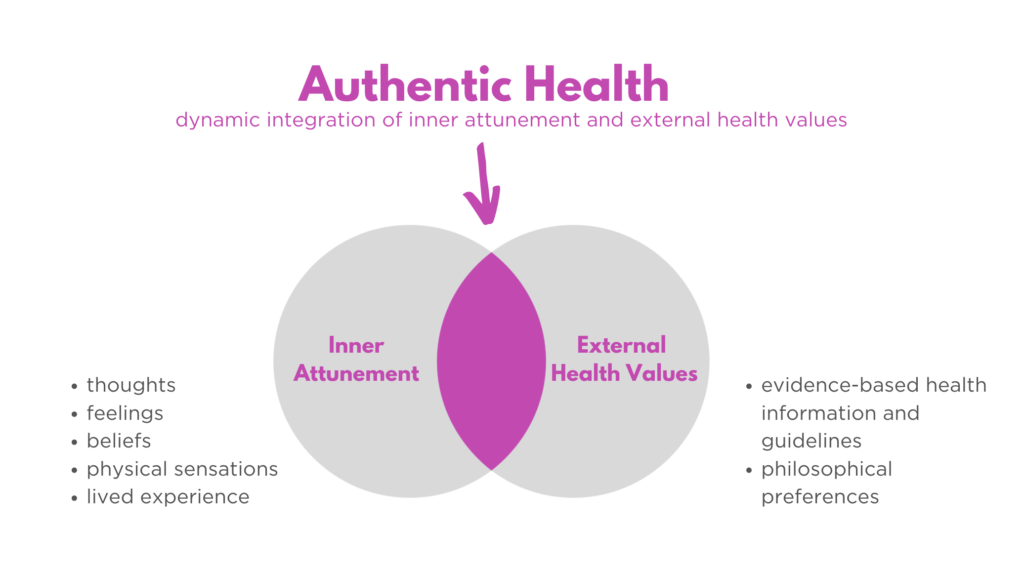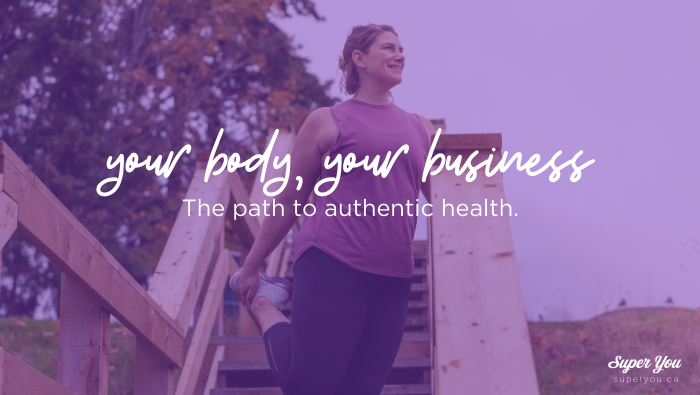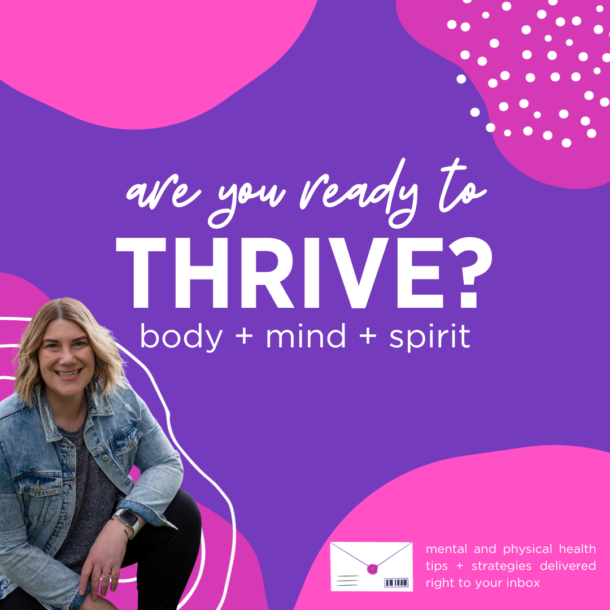This is a fundamental tenet of my entire Super You philosophy: there is no one right way to be healthy. No rules or plan to follow. Just you tuning into the practices and strategies that serve and support you on your path to authentic health.
And it sounds so, simple – so obvious. Of course my body is my business. But so often in the practice of health and fitness we don’t own it. Instead we tend to take a more “blind faith” approach – we trust “the plan,” “the program” or “the expert.” And I think it’s this approach that is preventing us from discovering a lasting and authentic approach to health.
What’s wrong with “blind faith?”
I think there are a few layers of issue with this blind faith approach. The first is that as a culture we’ve lost our healthy skepticism when it comes to who we trust. Secondly, we’ve prioritized the input of these plans/ programs/experts over our own lived experience and inner attunement (thoughts, beliefs, feelings and physical sensations).
In this blog I’m going to tackle these issues head on. And offer a completely counter approach. One that values your inner attunement and lived experience over that of an arbitrary “expert.” Because I genuinely think this counter-culture approach is fundamental if we want authentic (unique to our individual needs/ desires/ priorities) health that is truly sustainable.
Autonomy vs. Authority, what’s the diff?
By definition, autonomy is the “right or condition of self-government.” Essentially, the notion that you as an individual have the capacity and capability to make decisions for yourself.
But the traditional health and fitness field isn’t rooted in this philosophy, its build on an authoritarian philosophy. Whereby the health guru, fitness professional or nutrition expert is the only one who knows the way. And you’d better follow it if you want to feel/ look/ be in your “best” health. Often as defined by arbitrary cultural norms, of course (thanks Diet Culture).
What is the Cole’s Notes difference between authority and autonomy?
- Authority – input and information from experts defines our choices.
- Autonomy – input and information from experts informs our choices. But ultimately we place more emphasis is placed on lived experience and our unique individual thoughts/ beliefs/ feelings and physical sensations.
What’s wrong with trusting the experts?
There’s nothing inherently wrong with trusting experts. Information and input from qualified experts can be absolutely instrumental and essential to our health. But it must be used in combination with input from our inner attunement and lived experience (aka autonomy). And… there are a couple of issues we need to address here so we can be savvy in our integration of this expert advice.
Issue 1:Influencer does not equal expert.
We live in a culture where popularity taints our perception of validity. In the age of “influencers” and marketing machines it’s no surprise that there are subcultures associated with diet trends and fitness fads with no research backing them (or often common sense). Even if there is zero validity in the approach if the “right person” gets behind it – it will take off like wild-fire. This doesn’t mean it’s valid and it most certainly doesn’t mean it’s right for you or your body!
Issue 2: Not all experts are equal.
The titles “Personal Trainer,” “Nutritionist” and “Health Coach” are not regulated. Which means anybody can use them. Education in these “professions” varies from literally nothing to a Bachelors or Masters Degree (and sometimes more). And here’s the bigger issue with this. Because there’s a lack of governance of these titles, many fitness, nutrition and health “professionals” have no requirements of continuing education to maintain their title. Which means unless they’re highly motivated individuals it’s unlikely that they’re actively up to date on the research and best practices.
Issue 3: All experts have a lens.
We also need to remember that advice from any expert is always influenced by the lens they wear. Even even if the expert is qualified, credentialed and pursuing ongoing continuing education, and their advice is evidence based. Ultimately, the philosophy of each expert is tainted with the lens they were given through their experience. This includes the education they received (and the inherent beliefs/ values within that education) as well as their lived experience. Even if they pursue continuing education, they’re likely to cherry pick the courses and trainings that align with their personal values and beliefs. So unless an expert is actively seeking to challenge their values and beliefs, their advice will be biased.
Issue 4: There’s a best practice lag.
Many plans, programs and advice are based on out-dated research that has been dis-proven. Yet it still remains within the philosophical approach because it takes time for the latest research to infiltrate best practices. For example, the issues with BMI have been highlighted for more than 10 years within the Health at Every Size (HAES®) philosophy. But it’s only recently (this fall) that the Canadian Medical Association finally advised doctors to stop using this metric.
Taking an Authentic Health Approach
All of this might leave you feeling a bit disheartened, but that’s not my intent – at all. My intent is to provide you with what I believe is truly empowering information. Because when you recognize that information is simply information – not fact or rule, and it’s up to you what you decide to integrate, you realize you are in the drivers seat in your health.
And while that might feel overwhelming (and it can be at times) in my experience as a coach (and a person navigating these same waters) it’s often a huge weight lifted. Because when I can’t “stick to” the plan/ program or follow the advice – I can see it’s not me, but instead that it’s not the right plan/ program/ information for me and/or my life!
It empowers us to mindfully consider the information provided by experts and integrate that information with a high priority placed on our own lived experience and inner attunement (aka. autonomy).
This is what we call “Authentic Health” within Intuitive Eating framework. And while it applies to nutrition, it also applies to all things health: sleep, movement, mental health practices, spiritual health practices, etc.

The Authentic Health Bottom Line:
All of this means there is a LOT of information “out there” that may or may not suit you and/or your body.
And this pursuit of health – body/mind/spirit….it’s about YOU!
Which is why I think it’s really important to reclaim body AUTONOMY and release the belief that someone “out there” knows better than you how to care for your body.
This doesn’t mean you can’t learn from or take advice from qualified professionals. Not at all. Be a sponge for good quality information! But ultimately, aim to place HIGHER value your own lived experience and your own personal intuitive/ body wisdom.
As you venture forth, consider where are you blindly accepting “authority” when it comes to matters of your health (body/ mind/ spirit). Ask yourself these questions to encourage this approach:
- Where does this health/ body belief or value come from?
- Is the source of this information evidence-based? Accurate? Current?
- Does this practice/ habit SERVE and SUPPORT me?
- When I practice this strategy, does it FEEL GOOD in my body?
- Does this feel RIGHT (for me/ my life)?
Stay curious and remember that you are your best guide when it comes to your body. And if you have a coach/ professional telling you they know better than you, seriously consider whether they have your best interests at heart.
Trust your body. Trust your lived experience. And trust your instincts around what ideas, information and tools will and will not work for you based on your inner attunement. Your body, your business.
If you’d like some support tapping into your Authentic Health I’d love to connect. Book a 15-minute discovery call and let’s explore whether this approach is the right fit for you!

